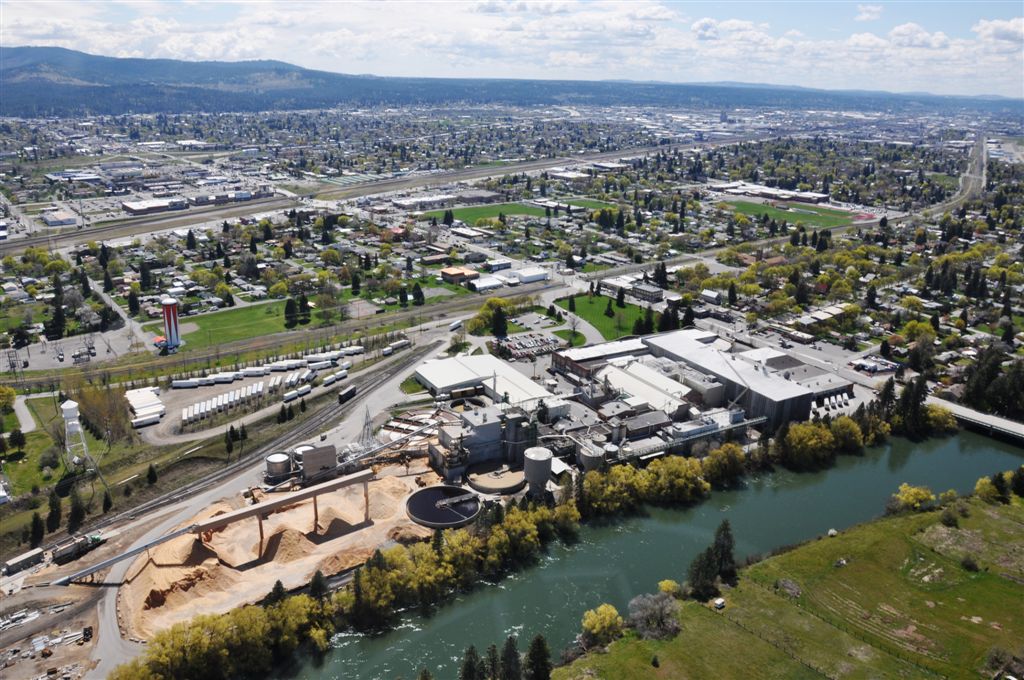
Our Processes
Over the past ten years Inland Empire Paper Company (IEP) has embarked on a modernization program that has resulted in improvments to nearly every process within the mill using state-of-the art equipment. With these investments, this phased modernization effort has raised IEP’s status to the most modern newsprint facility in the world. With these improvements, IEP has positioned itself to remain a vital contributor to the community and a leader in climate change improvements resulting in significant greenhouse gas reductions in Washington State
In recognition of these significant contributions, IEP was designated the 2010 Manufacturer of the Year for medium-size companies by the Association of Washington Businesses. IEP will continue to be proactive in the research and implementation of state-of-the-art technologies to enhance the plant’s production and efficiency, and to minimize its impact on the environment.
EFFICIENCY
TMP/Heat Recovery:
The Thermo-Mechanical Pulping (TMP) process produces pulp from waste wood chips collected from local sawmills. The new state-of-the-art refiner equipment includes a heat recovery system that efficiently recovers waste heat generated by the refining process. The recovered energy from this new system significantly reduced IEP’s dependence on natural gas by approximately 77% or 500 million cubic feet annually.
One of this project’s most significant benefits is the reduction in IEP’s carbon footprint. The decrease in natural gas consumption with heat recovery results in a reduction in IEP’s carbon dioxide emissions in excess of 30,000 tons/year.
Paper Machine:
In 2001 IEP installed a modern, energy efficient paper machine that remains the newest of its kind in North America. The machine uses heat recovery and water reuse to minimize energy and water consumption. This investment also incorporates the latest technology in papermaking that allows IEP to manufacture over 50 different grades of paper and the ability to switch grades on the run at a moment’s notice. This flexibility creates a much broader market for IEP’s products and allows for immediate response to customer demand.
RECYCLING
Nearly all of the raw materials to manufacture IEP’s products are composed of waste products generated by society and industry. IEP refines wood waste materials from local sawmills as virgin fiber to account for approximately 70-90% of its final newsprint product. The balance of fiber is provided by pulp produced from the recycling of old newsprint, telephone books, magazines and office waste. The installation of a facility to recycle approximately 120 tons per day (TPD) of old newspapers helped create a market for waste paper collected by municipal solid waste management programs. The recycle plant has been upgraded numerous times over the past ten years to increase the system capacity to 335 TPD and contend with contaminants from increasing single-stream supply.
WASTE-TO-ENERGY
Biomass waste generated from the processing of recycled paper products and waste wood chips is removed as sludge from IEP’s wastewater treatment system. A Fluidized Bed Combustion (FBC) system was installed to convert 50 dry tons per day (dtpd) of sludge to energy for use within the mill. “Green Energy” produced with combustion of the sludge has offset approximately 25% of the mill’s steam energy demand previously produced with natural gas. Consumption of sludge in the FBC system greatly minimizes solid waste disposal, converts the sludge waste to an inert ash product, and reduces hauling volume resulting in less truck traffic and associated transportation emissions. Furthermore, the majority of ash generated by the FBC is currently being recycled as a concrete admixture or used for composting.
WATER QUALITY
IEP has the most advanced water treatment system in the Pulp and Paper Industry, and is the first to treat all of its water with state-of-the-art membrane technology that provides a microscopic barrier (7,500 times smaller than the width of a human hair) removing essentially all solids.
WATER CONSERVATION
Beginning in 2004, IEP embarked on an aggressive water conservation program. Numerous projects have been implemented, including: re-use of wastewater in various mill processes, re-use of water within the recycle plant, installation of water control devices on pump seals, and optimization of water intensive processes. Since the beginning of this program, IEP has reduced its treated wastewater flow by approximately 1.0 to 1.5 million gallons per day. IEP is continuing with these efforts and expects continued reductions in the future.